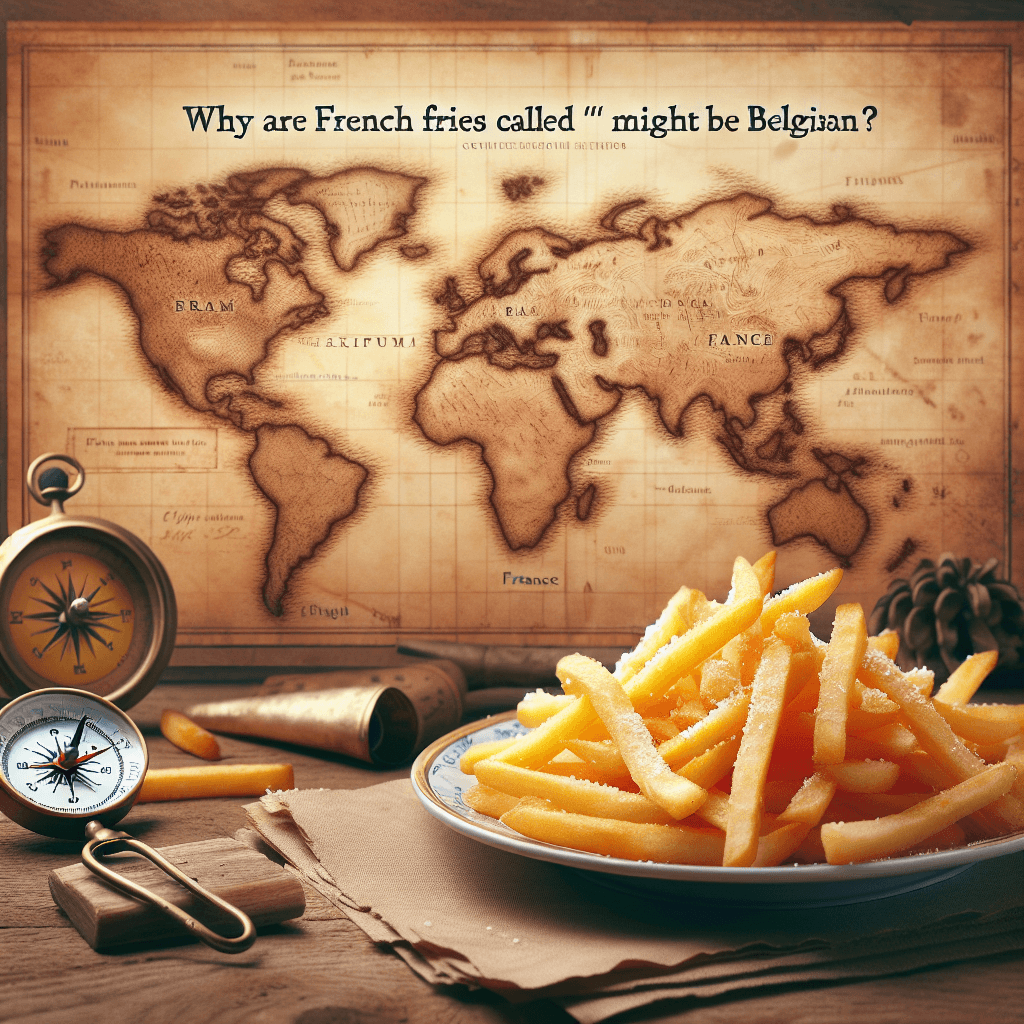The Crispy Conundrum: Why Are French Fries Called 'French' if They Might Be Belgian
Ever wonder why we call them 'French' fries? This post unpeels the fascinating history and compelling case for their Belgian origins, exploring a story of culinary claims and linguistic quirks.


Too Long; Didn't Read
Despite the name, French fries may have originated in Belgium, not France. The name's origin is debated, possibly stemming from a linguistic mix-up during wartime.
The Crispy Conundrum: Why Are French Fries Called 'French' if They Might Be Belgian?
Golden, crispy, and utterly irresistible – French fries are a global culinary icon, a comforting side dish, and for many, a perfect snack. But have you ever paused mid-bite to wonder about their name? Why "French" fries, when a compelling and passionate case is made for their Belgian origins? This seemingly simple question unpeels a fascinating history filled with culinary claims, linguistic quirks, and wartime encounters. This post dives into this delicious debate, exploring the historical threads and popular theories to understand why these beloved fried potato sticks carry the 'French' moniker, even if their passport might say Belgian.
The Belgian Roots: A Tale from the Meuse Valley
Many food historians and proud Belgians point to the Meuse Valley in Belgium as the true birthplace of what we call French fries. The story, widely circulated, dates back to the late 17th century, around 1680. According to local lore, impoverished villagers in the regions of Namur, Andenne, and Dinant often fried small fish caught from the river Meuse for their meals. However, when the river froze over during harsh winters, making fishing impossible, they supposedly turned to potatoes. They would cut the potatoes into the shape of small fish and fry them in oil, just as they did with their usual catch.
While concrete, contemporary written evidence from the 1600s specifically detailing this practice is scarce, leading some to view it as a cherished national legend rather than hard historical fact, the tradition of fried potatoes is undeniably deep-rooted in Belgium. Today, "frites" (or "frieten" in Dutch) are a national dish, with "friteries" (fry shops) being an integral part of Belgian culture, often serving them in paper cones with a variety of distinctive sauces. Belgians also often champion the double-frying method as key to their superior texture, a practice they claim perfects the fry.
The French Connection: "Pommes Frites" and Culinary Terminology
On the other side of the debate, France also has a strong claim, or at least a strong connection to the name. Potatoes gained widespread acceptance in France largely thanks to Antoine-Augustin Parmentier in the late 18th century. While Parmentier championed the potato for its nutritional value, the popularization of fried potatoes in Paris is often dated to the period just after the French Revolution or the early 19th century. Street vendors, particularly on the Pont Neuf in Paris, were known to sell "pommes frites" (literally, "fried potatoes").
There are a couple of prominent theories as to why the "French" label stuck:
- The Culinary Cut: One persuasive argument is that "French" refers to the style of cutting the potatoes. In culinary terms, "to French" means to cut food (often vegetables) into long, thin strips, also known as julienning. Therefore, "French-fried potatoes" could simply mean potatoes that have been "Frenched" (cut into strips) and then fried, irrespective of their national origin.
- Wartime Encounters: A very popular theory attributes the name to American and British soldiers stationed in Belgium during World War I. They supposedly encountered the dish in the French-speaking parts of Belgium. Since the local language spoken by their Belgian comrades and vendors was French, they might have colloquially dubbed the fried potatoes "French fries." When these soldiers returned home, they brought with them a taste for these fries and the name they'd associated with them.
Thomas Jefferson's Influence
Adding another layer to the American adoption of the term, some accounts suggest that Thomas Jefferson, during his time as American Minister to France (1785-1789), encountered "pommes de terre frites à cru, en petites tranches" (potatoes deep-fried raw, in small cuttings). He is said to have served them at a White House dinner in 1802, describing them as "potatoes served in the French manner." This could have helped solidify the "French" association in the United States, long before World War I.
A Deliciously Disputed Legacy
So, are French fries French or Belgian? The historical jury is still somewhat out, with passionate arguments on both sides. Belgium lays a strong claim to the origin of frying potatoes as a standalone dish, with a deeply embedded cultural tradition. France, on the other hand, was instrumental in popularizing the potato itself and the term "pommes frites," and the "Frenching" cut provides a logical linguistic link.
It's very possible that fried potatoes emerged independently in different places, or that the idea traveled and evolved. What's clear is that the name "French fries" likely stuck due to a combination of factors: the culinary term for the cut, experiences of English-speaking soldiers in French-speaking regions of Europe, and early introductions to American gastronomy via French culinary traditions.
Conclusion: Savoring the Story
The debate over the origin of French fries adds a fascinating layer to one of the world's most beloved foods. While Belgium presents a compelling historical narrative for inventing the dish, the "French" in "French fries" likely refers more to a culinary technique, a linguistic misunderstanding by soldiers, or early associations with French cuisine in America, rather than a definitive statement of national origin. Regardless of whether their roots are truly Gallic or Belgian, French fries have conquered the globe. So, the next time you indulge in a serving of these golden delights, you'll have a richer appreciation for their complex and deliciously disputed history – a story that’s almost as satisfying as the fries themselves.


